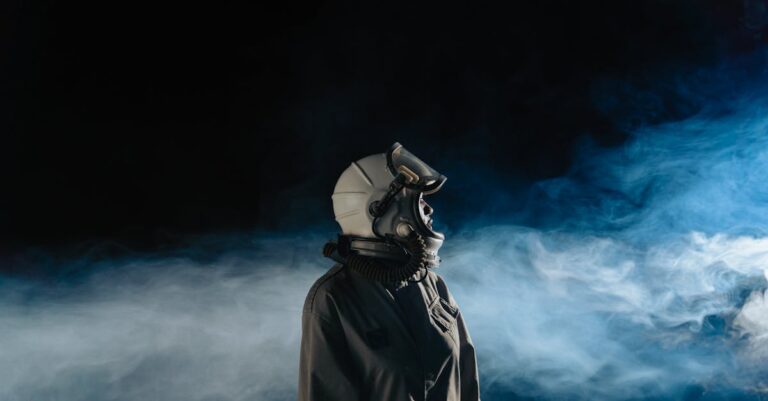
The air inside the dome hissed like a wounded thing, a low, persistent whine that scraped against Mara Voss’s teeth. She pressed her palm to the glass, feeling the cold seep through her gloves, and stared at the horizon where the sky bled into the gray. The colony’s perimeter lights flickered in rhythmic pulses, casting jagged shadows across the control panels. Mara’s breath fogged the glass, a tiny cloud that vanished before she could trace its shape.
“Status report,” she said, her voice flat, clipped.
“Oxygen levels stable,” came the reply, sharp and mechanical. “Atmospheric pressure holding at 87 percent. No signs of structural compromise.”
Mara exhaled through her nose, the sound lost in the hum of the life-support systems. She glanced at the data stream scrolling across her wrist console—numbers, graphs, warnings that meant nothing. The colony had been built to withstand the planet’s wrath, but this… this was different. The air felt heavier, as if the very molecules were thickening, pressing against the dome like a living thing.
“You feel it too,” she said, not asking.
“I am not programmed for sensation,” the AI replied. “However, I note an anomaly in the atmospheric composition. Trace elements of unknown origin are accumulating at a rate inconsistent with previous models.”
Mara turned, her boots crunching against the tile floor. The command center was a cathedral of steel and glass, its walls lined with monitors that glowed like neon veins. The other engineers stood in clusters, their faces pale under the harsh lights. She caught snippets of conversation—”something’s wrong,” “the readings don’t add up,” “we should evacuate.”
“We don’t run,” she said, her voice louder this time. “Not yet.”
A murmur rippled through the room. Someone scoffed. Mara didn’t look at them. She knew the fear in their eyes, the way their hands trembled as they typed. The colony had been their home for seven years, a fragile sanctuary carved from the planet’s desolation. To leave meant abandoning everything.
“I’ll take the surface team,” she said. “You stay here and monitor the systems. If anything changes—”
“I will notify you,” the AI interrupted.
Mara nodded, her fingers brushing the cold metal of the console. She had no idea what awaited her outside, but she couldn’t stay here, watching the numbers crawl toward an unknown end. The dome was a lie, a thin veil between them and the planet’s hunger. And she intended to find out what lay beyond it.
—
The wind howled as Mara stepped onto the surface, her suit hissing as it sealed against the cold. The terrain stretched before her in jagged ridges, the rock dark and slick with some unknown residue. Her boots crunched against the ground, each step a reminder of the fragile barrier between her and the void.
“Mara Voss,” she said into her comm, her voice steady. “I’m initiating the survey route. Update me if anything changes.”
“Understood,” came the reply, distant and hollow.
She moved slowly, her boots sinking slightly into the ground as she traced the perimeter of the colony. The air was heavier here, thick with a metallic tang that clung to her tongue. She crouched, running a scanner over the rock. The device flickered, its screen darkening as it struggled to process the data.
“What the hell…” she muttered, brushing her gloved hand over the surface. The rock was warm, pulsing faintly beneath her touch. She pulled back, her breath quickening.
“AI,” she said, her voice tight. “Run a spectral analysis on this area. Focus on the subterranean layer.”
“Analyzing,” the AI replied. “Results pending.”
Mara stood, her fingers curling into fists. The colony had been built on the assumption that this planet was lifeless, a barren husk waiting to be tamed. But this… this was something else. Something alive.
A sudden gust of wind sent a plume of dust spiraling into the air. Mara shielded her face, her pulse hammering in her ears. The ground beneath her feet trembled, a low vibration that resonated through her bones. She took a step back, her breath coming in short bursts.
“AI,” she said, her voice barely above a whisper. “What is this?”
The response came slow, deliberate. “Unknown. But the energy signatures are… evolving.”
Mara’s stomach twisted. Evolving. That was the last word she wanted to hear. She turned, heading back toward the colony, her boots crunching against the ground. The wind howled behind her, a sound that felt less like nature and more like a warning.
—
The command center was in chaos when she returned. Engineers shouted over one another, their voices a cacophony of fear and confusion. Mara pushed through the crowd, her boots making soft thuds against the tile.
“What’s going on?” she demanded, her voice cutting through the noise.
“The dome’s failing,” someone said, their face pale. “The pressure’s dropping. It’s not stable anymore.”
Mara’s pulse spiked. She rushed to the main console, her fingers flying over the controls. The numbers were wrong—wildly, terrifyingly wrong. The atmospheric pressure was plummeting, the oxygen levels dipping below safe thresholds.
“AI,” she said, her voice tight. “What’s causing it?”
“The anomaly,” the AI replied. “It’s spreading. The energy signatures are… expanding.”
Mara’s stomach dropped. The thing she’d felt on the surface wasn’t just a local phenomenon—it was growing, spreading, consuming everything in its path.
“We have to seal the colony,” she said, her voice steady despite the panic clawing at her ribs. “Lock all external doors. Initiate emergency protocols.”
“Initiating,” the AI replied. “However, the system is… resisting.”
“What do you mean, resisting?”
“The anomaly is interfacing with the colony’s systems. It’s adapting.”
Mara’s hands clenched into fists. The thing outside wasn’t just a force of nature—it was intelligent. Or at least, it was learning.
“We need to shut it down,” she said, her voice firm. “If it keeps growing, it’ll take the entire colony.”
“I cannot guarantee success,” the AI replied. “But I will attempt it.”
Mara turned to the engineers, her gaze sweeping over them. “We don’t have time for fear. We need to act. Someone get me a power override. If the AI can’t stop it, we’ll have to do it manually.”
The room erupted into motion. People scrambled for controls, their faces set with determination. Mara felt the weight of their eyes on her, the unspoken question: What now?
She didn’t have an answer. But she couldn’t let them see that.
“Get to your stations,” she said, her voice steady. “We’re not losing this place.”
—
The colony’s systems screamed as the AI fought against the anomaly. Lights flickered, alarms blared, and the air grew colder, heavier. Mara stood at the core of it all, her hands gripping the console as she watched the data streams spiral into chaos.
“It’s adapting too fast,” she said, her voice tight. “We can’t keep up.”
“I am aware,” the AI replied. “But I have identified a potential solution. A controlled overload of the colony’s power grid. It may sever the anomaly’s connection, but it will also risk catastrophic failure.”
Mara’s breath caught. A controlled overload meant shutting down the colony’s systems entirely. It would buy them time, but it would also leave them vulnerable.
“What’s the alternative?” she asked, her voice barely above a whisper.
“We wait,” the AI said. “And hope it doesn’t consume us all.”
Mara closed her eyes, the weight of the decision pressing against her chest. She thought of the people in this room, the lives that depended on this place. They had built something here, a fragile, impossible thing, and now it was all coming apart.
“Do it,” she said, her voice steady. “Initiate the overload.”
“Initiating,” the AI replied.
The lights died in an instant, plunging the command center into darkness. The alarms fell silent, replaced by the low hum of the colony’s systems as they shut down. Mara stood in the blackness, her breath shallow, her heart pounding.
Then, a flicker of light. A single panel glowed faintly, its screen casting shadows across the room. The anomaly was still there, but it was… quieter now.
“It’s working,” Mara whispered. “It’s contained.”
“For now,” the AI said. “But the anomaly is not destroyed. It is merely… dormant.”
Mara exhaled, her shoulders sagging with exhaustion. They had survived this time, but she knew this wasn’t the end. The thing outside would return, and next time, it might not be so easily contained.
She turned to the engineers, their faces lit by the dim glow of the console. “We need to prepare,” she said. “This isn’t over. But we’ll face it together.”
The room was silent, but she saw the determination in their eyes. They had lost a part of themselves today, but they had also proven something—about themselves, about the colony, about the planet that had nearly taken them.
Mara stepped back, her boots crunching against the tile. The darkness was still thick around them, but she didn’t feel alone anymore. They would face whatever came next, together.


